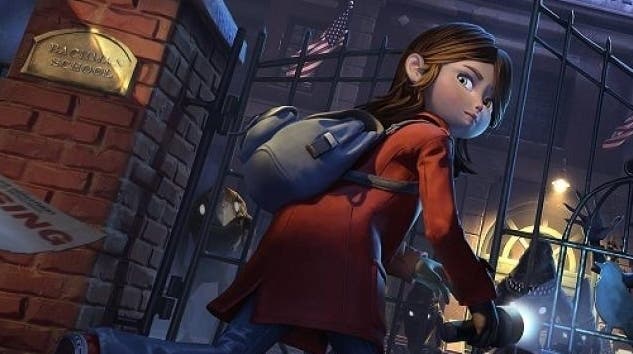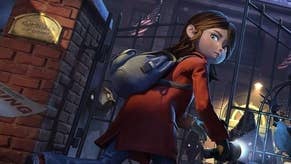Gylt review - Stadia exclusive is genuinely unsettling lite horror
Guilty pleasure.
"You can trust me," it says, as I tip-toe as swiftly as I dare into a dark corner, concealing myself - I hope - against a pile of damp, forgotten boxes. It lurches drunkenly from side to side, eyes glowing in the inky blackness of the room, head spinning at unnatural angles as it scans the space, primed for the slightest flicker of movement.
"Come here," it adds in its sweet, musical voice. "Don't hide."
I risk peering over the top and instantly regret it: I've been spotted. Screeching with delight, it launches itself at me, face splitting in two to reveal a horrifying, pulsing void as it scurries after me, trying to suck me in. I grab my flashlight and wave it vaguely in its direction - I say vaguely because it's leaping about a lot and I'm panicking here - but it's ineffectual. Nothing's happening. I realise there's nowhere else to go, and the panic intensifies.
Not for the first time, I realise I'm not entirely sure what's going on. This world may look sweet and innocent with its Play-Doh colours and cartoonish aesthetics, but - as I'm belatedly realising - it's anything but.
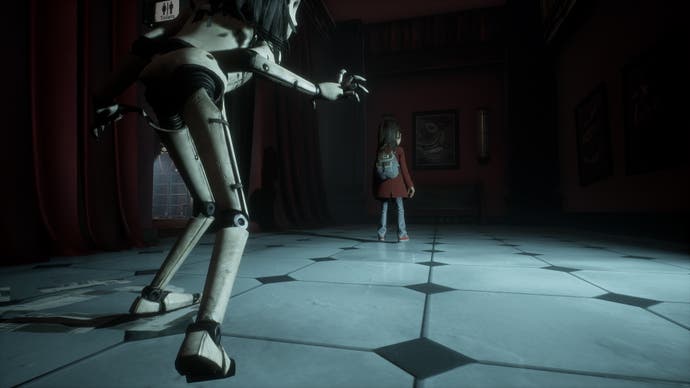
I'm ashamed to say I came into Gylt a little smug. I'd glanced over the game's bumf and screenshots with curiosity but met its Teen rating with a derisory chuckle. The trailers had us thinking the game, which is exclusive to Google's Stadia streaming service, was a horror-lite title, something for kids and the easily spooked. But developer Tequila Works has done a number on me.
The cutesy design and uncomplicated mechanics lulled me into a false sense of security. Even the enemies seemed a little unremarkable to start with. You're not ever going to mistake Gylt for P.T., but don't let that mislead you. Boasting a tense atmosphere, a striking style and a sublime score that recalls Danny Elfman's work with Tim Burton, Gylt has the power to be deeply unsettling.
You'll see echoes of the seminal psychological horror Silent Hill flickering throughout much of the game, from the splintered dead-end roads to the main character Sally's surname, Kauffman. You'll spend a lot of time creeping through Bachman School - a nod to Stephen King, Silent Hill, or both, perhaps? - its walls scratched and clawed with spiteful insults and childish name-calling. Occasionally, you'll stumble upon a mannequin or two, some posed, some not, assembling in classrooms and corridors and toilet stalls. The more you play, the more you'll encounter. Eventually, they're everywhere.
Gylt's surprisingly light on story, though. You follow Sally, a young girl trying to locate her missing cousin, Emily. After plastering posters around the place to keep Emily's name in the town's consciousness, Sally is pursued by school bullies, forcing her bike off the road and into a ravine. With their taunts echoing around her, she grabs the posters, leaves her mangled bike where it fell and heads for home - only she never gets there.
Sally's nightmare is focused chiefly on a twisted facsimile of the school both she and Emily attended, although you'll sometimes venture outdoors towards other kid-centric places such as an arcade or local arts centre. There's not much variation in the gameplay at all. There's a lot of: find this key, get that valve, reach this vent, in between combat or stealth sequences. There's a handy detection meter that's fab for when you're attempting to scrabble through without daring to look back. And there are plenty of vents which Sally can duck into, usually leaving a silhouette - the enemy's last betraying sighting of her - in her wake.
Ostensibly, you can play according to whichever impulse drives you strongest: fight or flight. But it's hard to be offensive for long given your weapon - a flashlight initially, although you'll later acquire a dual-purpose fire extinguisher - is battery-operated. There are usually enough replacement batteries and health top-ups (discarded asthma inhalers) to keep you going, so progress is never punishing, but a couple of stingy respawn points frustrate.
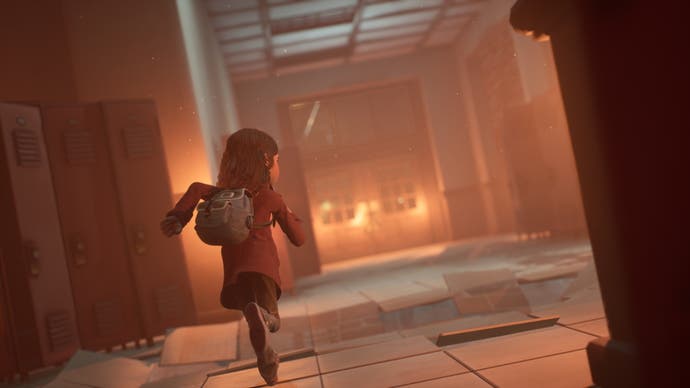
In my notes, I wrote that Gylt is a horror game with light puzzling, light combat and light scares - but I had to cross that final bit out. While not stuffed with them, Gylt has a handful of delicious jumpscares that should get your heart racing, particularly when the game masterfully subverts what it's taught you. Safe areas might not always be safe; an empty room might not always remain empty.
There isn't much subtlety about Sally's nightmare world, though. It's stuffed with the hard-to-miss symbolism of childhood bullying as well as diary entries and scribbled notes that speak, convincingly, of a life tormented by bullies. Hang in there long enough, however, and the tone shifts. A diary author talks of monsters that "reek of blood and gunpowder", perhaps intimating a different sur-reality to the one Sally inhabits. Another tells the heartbreaking account of a child embracing the recommendation of a well-meaning adult by trying to look friendly in order to attract friends: "I ran to the bathroom and looked at myself in the mirror. I think I have a nice smile... but it doesn't work because I can't stop crying." Oof.
Whilst the bullying theme is trowelled on, other issues - such as the mysterious stone people, or some of the game's more curious collectables - are not expanded upon at all. And while the title Gylt suggests a particular outcome, the game's conclusion feels both rushed and anticlimactic. The final boss encounter - a lazy, frustrating affair that's squeezed of all impact by peculiar camera angles and a lack of proper instruction - is, sadly, as linear and predictable as the rest of the tale.
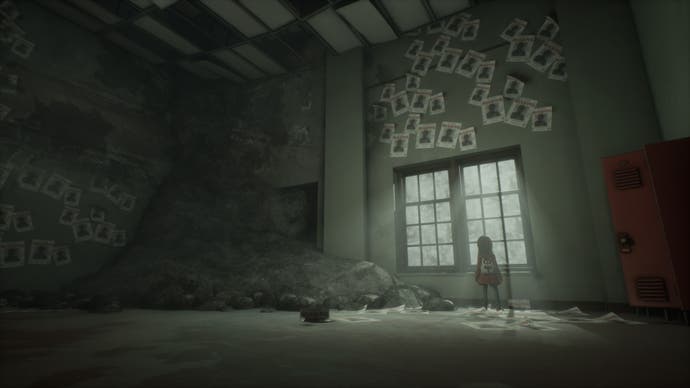
As for how it runs on Stadia? I admit it: I'm surprised. With an unwired but half-decent connection (35-ish mbps on a good day) I experienced a couple of stutters, but nothing too distressing save one hard crash. It did feel as though there was lag between triggering silent takedowns and the cinematic that shows them taking place, however, and it was often difficult to get the "A" button prompt to pop up when desired. The inventory was a curious beast, too; whilst there is, technically, a highlighter, it's barely discernible against the cream-coloured items in your backpack, so you're never entirely sure what you're selecting.
While playing it safe and a tad predictable, Tequila Works carefully layers on new gimmicks and mechanics as you progress through Gylt, allowing you to organically build on your knowledge and start experimenting. It's these flashes of inspiration that can make Gylt's gentle puzzling such a joy, so it's frustrating we don't see more of them. And while there's not much here for the hardcore horror fan, don't be deceived into thinking the eerie, tense Gylt is just for kids: it's really not. It is, however, a little expensive for such a brief, if atmospheric, experience.
